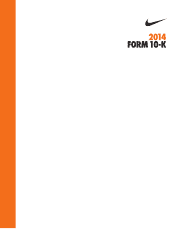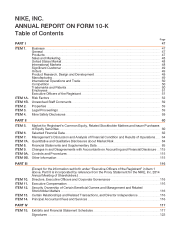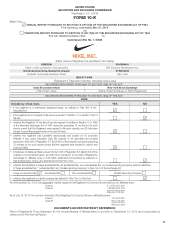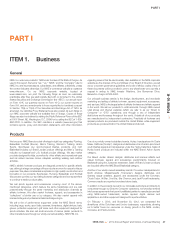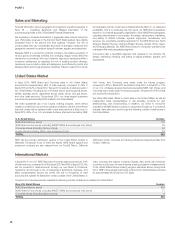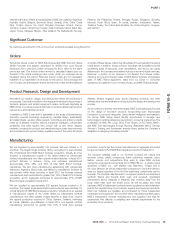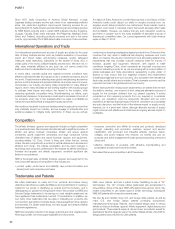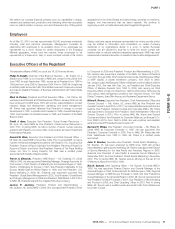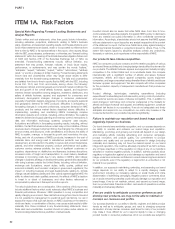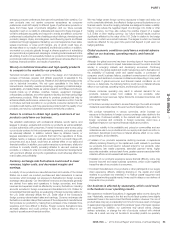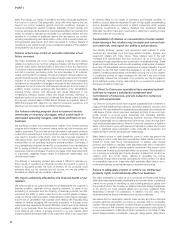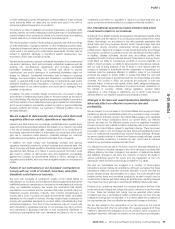Nike 2014 Annual Report Download - page 5
Download and view the complete annual report
Please find page 5 of the 2014 Nike annual report below. You can navigate through the pages in the report by either clicking on the pages listed below, or by using the keyword search tool below to find specific information within the annual report.
PART I
Sales and Marketing
Financial information about geographic and segment operations appears in
Note 18 — Operating Segments and Related Information of the
accompanying Notes to the Consolidated Financial Statements.
We experience moderate fluctuations in aggregate sales volume during the
year. Historically, revenues in the first and fourth fiscal quarters have slightly
exceeded those in the second and third quarters. However, the mix of
product sales may vary considerably as a result of changes in seasonal and
geographic demand for particular types of footwear, apparel, and equipment.
Because NIKE is a consumer products company, the relative popularity of
various sports and fitness activities and changing design trends affect the
demand for our products. We must, therefore, respond to trends and shifts in
consumer preferences by adjusting the mix of existing product offerings,
developing new products, styles and categories, and influencing sports and
fitness preferences through extensive marketing. Failure to respond in a timely
and adequate manner could have a material adverse effect on our sales and
profitability. This is a continuing risk. We report our NIKE Brand operations
based on our internal geographic organization. Each NIKE Brand geography
operates predominantly in one industry: the design, development, marketing,
and selling of athletic footwear, apparel, equipment, accessories, and
services. Our reportable operating segments for the NIKE Brand are: North
America, Western Europe, Central & Eastern Europe, Greater China, Japan,
and Emerging Markets. Our NIKE Brand Direct to Consumer operations are
managed within each geographic segment.
Converse is also a reportable segment, and operates in one industry: the
design, marketing, licensing, and selling of casual sneakers, apparel, and
accessories.
United States Market
In fiscal 2014, NIKE Brand and Converse sales in the United States
accounted for approximately 46% of total revenues, compared to 45% in
fiscal 2013 and 42% in fiscal 2012. We sell to thousands of retail accounts in
the United States, including a mix of footwear stores, sporting goods stores,
athletic specialty stores, department stores, skate, tennis, and golf shops,
and other retail accounts. During fiscal 2014, our three largest customers
accounted for approximately 26% of sales in the United States.
We make substantial use of our futures ordering program, which allows
retailers to order five to six months in advance of delivery with the commitment
that their orders will be delivered within a set time period at a fixed price. In
fiscal 2014, 86% of our U.S. wholesale footwear shipments (excluding NIKE
Golf, Hurley, and Converse) were made under the futures program,
compared to 87% in fiscal 2013 and 86% in fiscal 2012. In fiscal 2014, 71%
of our U.S. wholesale apparel shipments (excluding NIKE Golf, Hurley, and
Converse) were made under the futures program, compared to 67% in fiscal
2013 and 64% in fiscal 2012.
We utilize NIKE sales offices to solicit sales in the United States, as well as
independent sales representatives to sell specialty products for golf,
skateboarding, and snowboarding. In addition, our Direct to Consumer
operations sell NIKE Brand products to consumers through our e-commerce
website, www.nike.com, and through the following number of retail stores in
the United States:
U.S. Retail Stores Number
NIKE Brand factory stores 176
NIKE Brand in-line stores, including NIKETOWNs and employee-only stores 33
Converse stores (including factory stores) 84
Hurley stores (including factory and employee stores) 29
TOTAL 322
NIKE has five primary distribution centers in the United States located in
Memphis, Tennessee, three of which are leased. NIKE Brand apparel and
equipment products are also shipped from our Foothill Ranch, California
distribution center. Converse and Hurley products are shipped primarily from
Ontario, California.
International Markets
In fiscal 2014, non-U.S. NIKE Brand and Converse sales accounted for 54%
of total revenues, compared to 55% in fiscal 2013 and 58% in fiscal 2012. We
sell our products to retail accounts, through our own Direct to Consumer
operations, and through a mix of independent distributors, licensees, and
sales representatives around the world. We sell to thousands of retail
accounts and operate 16 distribution centers outside of the United States. In
many countries and regions, including Canada, Asia, some Latin American
countries, and Europe, we have a futures ordering program for retailers similar
to the United States futures ordering program described above. During fiscal
2014, NIKE’s three largest customers outside of the United States accounted
for approximately 6% of total non-U.S. sales.
Our Direct to Consumer business operates the following number of retail stores outside the United States:
Non-U.S. Retail Stores Number
NIKE Brand factory stores 459
NIKE Brand in-line stores, including NIKETOWNs and employee-only stores 71
Converse stores (including factory stores) 6
TOTAL 536
48

